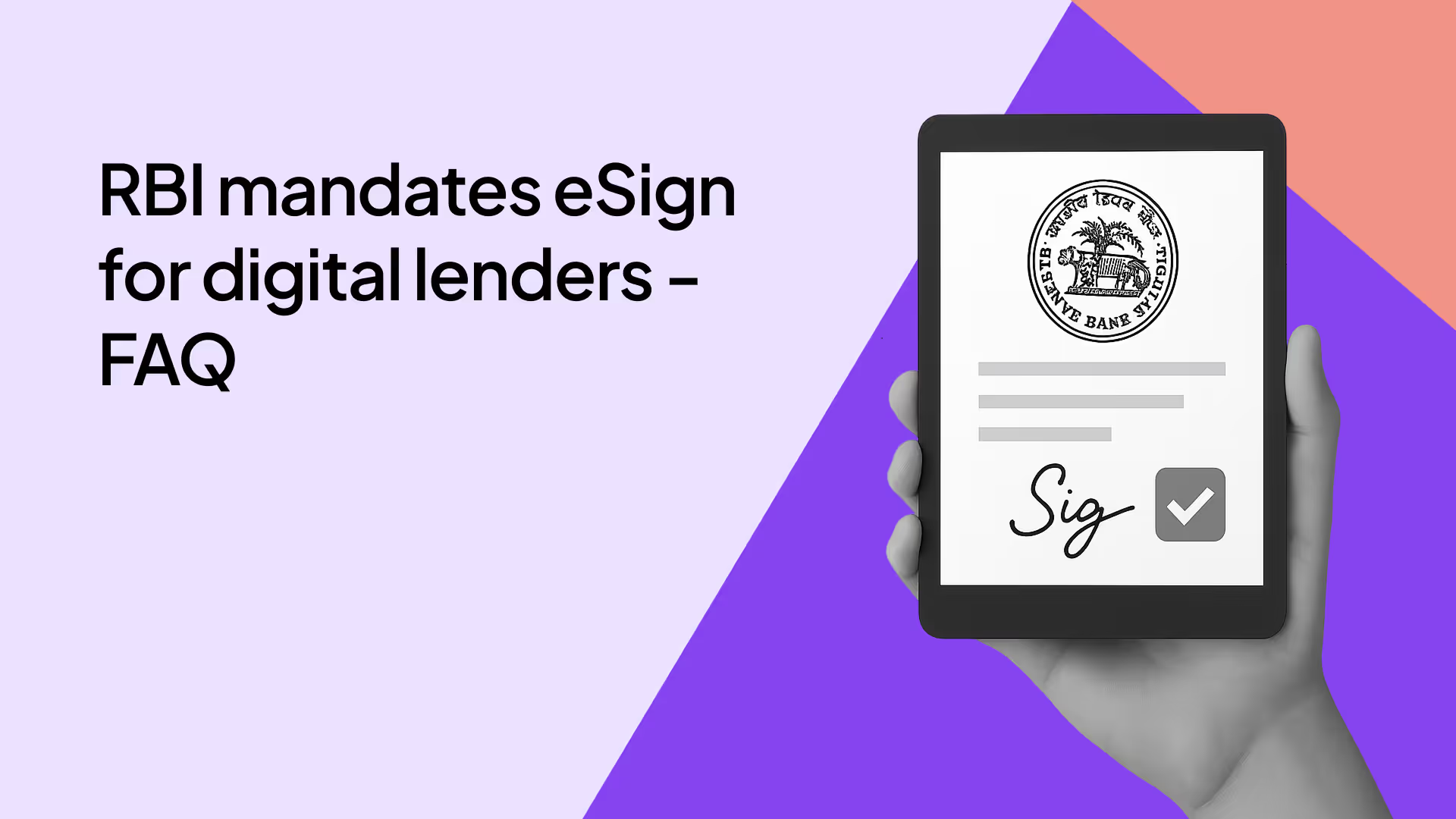On 10 November, 2022, we hosted a comprehensive webinar decoding RBI’s digital signing requirements for digital lenders. The webinar was well attended by representatives from more than 20+ digital lending and financial institutions.
Here is the recording of the webinar, and a copy of the presentation deck we used during the webinar.
During the webinar we received several excellent questions from our audience.
Here is a written transcript of the questions and their answers:
I have 3 product lines - one of them is fully automated while the other 2 have manual intervention. Will I have to comply with the digital lending guidelines for all 3 products or just for the automated one?
In our view, the digital lending guidelines only apply on a product-basis. If the lending product is digital AND automated then you will need to ensure that the flow is compliant with the guidelines. If the lending product involves manual intervention - by sales agents or RMs - then it does not fall under the digital lending guidelines.
So in the scenario above, only one of your lending flows - the automated, digital one - needs to comply with the digital lending guidelines.
As per the recent IT Act amendments, powers of attorney can be executed digitally. How will notarisation happen for digital PoAs?
Under law, there is actually no requirement for a Power of Attorney to be notarised. The reason why notarisation of PoAs has become common practice is because of the favourable presumption granted to notarised PoAs under Section 85 of the Indian Evidence Act, 1872. Basically, PoAs are notarized because it is legally beneficial to do so and NOT because it is legally mandatory.
With electronic signatures - you cannot notarize documents. However this does not matter because electronic signatures confer GREATER legal benefits on PoAs than notarization by virtue of Sections 85B(1), 85B(2), 67A and 85C of the Evidence Act. eSign is, therefore, a fantastic replacement for the notarial process itself.
DPNs can now be executed digitally via the recent IT Act Amendment - can I digitize the revenue stamps that accompany the DPN?
Yes, you can digitally affix revenue stamps on digital DPNs via Leegality BharatStamp.
However, we would recommend running this interpretation by your legal and compliance teams before you proceed.
Can we have separate workspaces on Leegality for different verticals - so that one vertical cannot access or view the other verticals data?
Absolutely. We can provide completely separate dashboards for each vertical. The dashboards are unconnected and there will be no sharing of data or access between them. So one vertical will not be able to access/view data from another vertical’s dashboard.
With respect to Doc Signer - isn’t it a requirement for the borrower to see who is signing on behalf of the RE? If so, how will Doc Signer accommodate this?
There is no legal requirement for the borrower to see who is signing on behalf of the RE. It is legally permissible for an organization to sign digital loan documents with its own name via Doc Signer.
However, with Leegality, you can also specifically configure a name of an authorized individual from the RE organization. This name will appear visually on the document next to the Doc Signer details.
Is it mandatory to share the Secure Audit Trail with the borrower? Can we avoid sharing it unless asked?
Leegality will share the Secure Audit Trail to all parties who sign. We will not withhold the audit trail from the borrower. This is to ensure full transparency in our role as a trusted intermediary facilitating legally valid document execution. This is also advantageous for you - since the borrower cannot later dispute a transaction on the ground that they did not receive an audit trail.
Is storing an organization’s signature with a third party legally allowed? What are the legal and compliance implications of this?
Even if your Doc Signer is hosted on Leegality’s servers - we don’t have any access to it. The DocSigner digital signature will be accessible to and usable only by the organisation which is procuring it in its name. Leegality simply acts as an intermediary platform which allows you to deploy DocSigner in your eSigning flows. Usage of Doc Signer through Leegality is fully compliant with eSign provisions under the IT Act.
You can read more about the process and benefits of procuring Doc Signer through Leegality here.
Do lenders need to manually sign/approve each agreement? Is there any automated option?
With Leegality’s Doc Signer plugin you can automated lender digital signatures in a fast, easy and compliant way. The lender won’t need to manually sign each digital loan kit.
Do I need to maintain servers to host the Doc Signer?
Not necessarily. You can host your Doc Signer on Leegality in a secure, compliant way.
RBI has set a deadline of November 30 for digital lenders to comply with the guidelines. That’s less than 20 days away!

